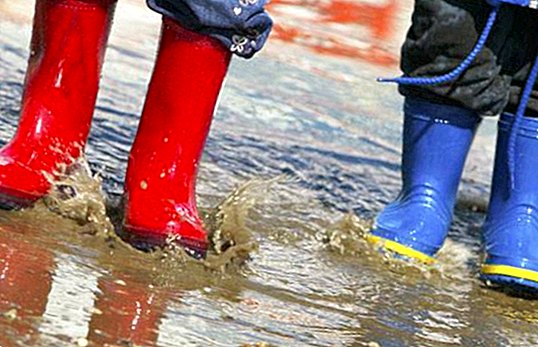Charged children's clothing: poison is in the shoe

Have you just bought a pair of new rubber boots from Tchibo? Or still fast with Aldi a few Matschwetter-pedal for the Kita taken? Then we have to spoil the mood, unfortunately. The environmental organization Greenpeace has taken children's clothing from discounters under the microscope and found: More than half of the samples contained environmentally and harmful chemicals above recommended levels. Children's clothing by Aldi, Lidl, Rewe and Tchibo was tested.
Children's shoes are the most affected. Especially the Rubber boots from Tchibo were contaminated with potentially carcinogenic polycyclic aromatic hydrocarbons (PAHs). The amount here was 2.2 mg / kg. By comparison, according to a new EU directive, child skin contact products from the end of 2015 should not contain more than 0.5 mg / kg of PAHs.
Also in the Shoes by Aldi (Booties "Alive" and "walkx kids") found the scientists of independent laboratories poison: They contained over 190 milligrams of dimethylformamide (DMF) per kilo. DMF can leach out of the material and is considered to be acutely toxic, toxic for reproduction and harmful to health on skin contact. The Federal Environment Agency recommends maximum levels of 10 mg / kg.
Almost all shoes tested also contained acetophone or 2-phenyl-2-propanol, substances that cause allergies and may irritate the skin or eyes. They are usually recognized by a pungent odor.
What to do with the poisonous boots?
So do we have to put these shoes on special waste immediately? No not that. The products are not dangerous to health, says the Federal Institute for Risk Assessment compared to "Zeit Online". And Greenpeace spokeswoman Carolin Wahnbaeck says at the request of ChroniquesDuVasteMonde MOM: "No one gets sick right away wearing the rubber boots, not even the kids, but the marginal and precautionary values are not in vain." We do not recommend that children go through the entire growth phase to suspend these chemicals. " Especially as the chemicals reach the environment, the waters and ultimately the food chain via products and factories. If you want to keep your shoes, you should make sure that the children always wear stockings and avoid direct skin contact.
It would be best, however, to bring the shoes back to the store, according to Greenpeace. "Tchibo has already taken back a pair of rubber boots, which has brought an angry consumer back to the store," says Carolin Wahnbaeck. In this way, as a consumer, one could increase the pressure on companies. Via Greenpeace you can also send a protest mail.
Greenpeace demands that manufacturers sell poison-free children's clothing in the future. "The by-business of discounters with questionable cheap clothing is booming," says Kirsten Brodde, the textile expert at Greenpeace. "Aldi, Lidl and Tchibo must use their market power to enforce clean production standards."
Play it safe with Biomode
If you do not want to take any risks, you should pay attention to the purchase of children's clothing. An overview of this list of quality seals and eco-standards for textiles. Rubber boots are made of natural rubber, for example. Even used children's clothing from the flea market or eBay is usually hardly burdened by the washing. Sustainable is second-hand clothing anyway.










